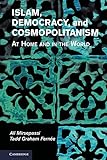Islam, democracy, and cosmopolitanism [Texte imprimé] : at home and in the world / Ali Mirsepassi, Tadd Graham Fernée
نوع المادة : نصتفاصيل النشر:New York : Cambridge University Press, 2014وصف:1 vol. (225 p.) : couv. ill. ; 24 cmتدمك:
نصتفاصيل النشر:New York : Cambridge University Press, 2014وصف:1 vol. (225 p.) : couv. ill. ; 24 cmتدمك:- 978-1-107-05397-7
- 321.8091767 23E
- 321.8A
| نوع المادة | المكتبة الحالية | المجموعة | رقم الطلب | رقم النسخة | حالة | تاريخ الإستحقاق | الباركود | |
|---|---|---|---|---|---|---|---|---|
|
|
Bibliothèque centrale En accès libre | Collection générale | 321.8A / 254 (إستعراض الرف(يفتح أدناه)) | 1 | المتاح | 000005520121 |
"This book presents a critical study of citizenship, state, and globalization in societies that have been historically influenced by Islamic traditions and institutions. Interrogating the work of contemporary theorists of Islamic modernity such as Mohammed Arkoun, Abdul an-Na'im, Fatima Mernissi, Talal Asad, Saba Mahmood, and Aziz Al-Azmeh, this book explores the debate on Islam, democracy, and modernity, contextualized within contemporary Muslim lifeworlds. These include contemporary Turkey (following the 9/11 attacks and the onset of war in Afghanistan), multicultural France (2009-10 French burqa debate), Egypt (the 2011 Tahrir Square mass mobilizations), and India. Ali Mirsepassi and Tadd Fernee; critique particular counterproductive ideological conceptualizations, voicing an emerging global ethic of reconciliation. Rejecting the polarized conceptual ideals of the universal or the authentic, the authors critically reassess notions of the secular, the cosmopolitan, and democracy. Raising questions that cut across the disciplines of history, anthropology, sociology, and law, this study articulates a democratic politics of everyday life in modern Islamic societies"-- Provided by publisher
Bibliogr. p. 209-216
Machine generated contents note: Introduction: citizenship, state, and globalization; 1. Ways of being in the world: religion and secularism; 2. Islams and modernities: Al-Azmeh's secular critique; 3. Talal Asad's romance with Islamism; 4. Arkoun's The Unthought in Islamic Thought; 5. An-Na'im's Islamic reformation: the reconciliation of equality of rights and the Shari'a; 6. Fatima Mernissi: 'locally' rooted cosmopolitanism; Conclusion
لا توجد تعليقات على هذا العنوان.


